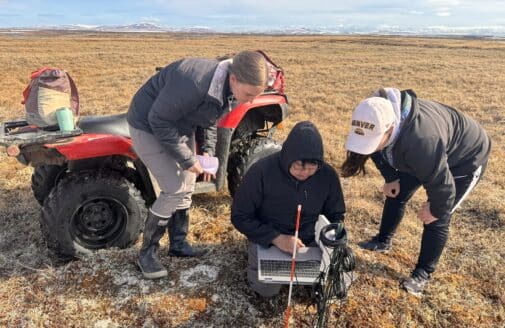New study finds anomalous Arctic warming linked with severe winter weather
Researchers warn rising Arctic temperatures will continue to exacerbate debilitating extreme winter weather

Arctic field site in Alaska National Wildlife Refuge.
photo by Misha Kanevskiy
A new study, published in Nature Communications Earth and Environment and co-authored by researchers at Atmospheric and Environmental Research, Inc. (AER) and Woodwell Climate Research Center, finds that abnormally warm temperatures in the Arctic are associated with a higher likelihood of severe winter weather including cold-air outbreaks and heavy snowfall in Northern Hemisphere continents.
“When the Arctic atmosphere is warmer than normal, we see a much higher likelihood of extreme winter weather across much of Canada, the northern U.S. and northern Eurasia,” remarked lead author, Dr. Judah Cohen at AER. “The relationship is especially strong in the northeastern sections of the continents.”
“Even though we’re seeing cold records being broken less often as the globe warms, we’ll still see debilitating spells of severe winter weather,” added co-author Dr. Jennifer Francis at Woodwell Climate. “There will be plenty of ice, snow, and frigid air in the Arctic winter for decades to come, and that cold can be displaced southward into heavily populated regions during Arctic heat waves.”
Recent disruptive extreme winter weather events—such as the deadly Texas cold spell of February 2021—have occurred and will continue to occur in the future, wreaking havoc on infrastructure, human wellbeing, and ecosystems, especially in areas unaccustomed to and ill-equipped for dealing with winter extremes.
“The Arctic may seem irrelevant and far away to most folks, but our findings say the profound changes there are affecting billions of people around the Northern Hemisphere,” added Francis. To reverse these trends, “it will take bold and rapid actions to reduce our burning of fossil fuels and the build-up of heat-trapping gasses in the atmosphere, but the tools exist if we can muster the will.”
According to Francis, recent studies have theorized that rapid Arctic warming, a pace three-to-four times faster than the globe as a whole, may increase the likelihood of extreme weather events owing to a reduced north/south temperature difference. In addition, slower westerly winds of the jet stream lead to more frequent convoluted jet-stream configurations, which lead to unusual weather.
“Disruptions in the typically stable stratospheric polar vortex may also occur more often in a warming climate,” noted Cohen, “and we know hazardous winter weather is more likely during these disruptions.”










